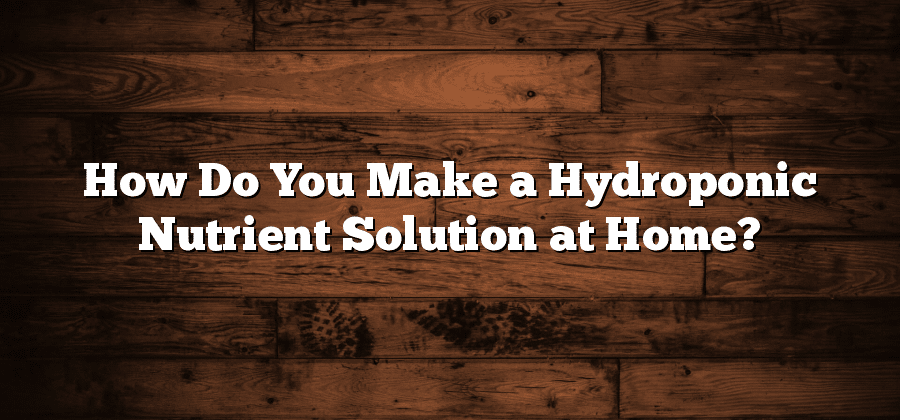Understanding the Basics of Hydroponic Nutrient Solutions
Hydroponic nutrient solutions form an essential component of successful hydroponic gardening. These solutions provide plants with all the necessary macro and micronutrients needed for their growth and development. Unlike traditional soil-based gardening, where plants obtain nutrients from the soil, hydroponic systems rely on nutrient solutions to deliver a precise balance of minerals directly to the plant roots.
The primary ingredients in a hydroponic nutrient solution include nitrogen (N), phosphorus (P), and potassium (K) – often referred to as NPK. Nitrogen supports vigorous leaf and stem development, phosphorus promotes healthy root growth, and potassium contributes to overall plant health and disease resistance. In addition to these macronutrients, hydroponic solutions also contain a mix of essential micronutrients such as iron (Fe), manganese (Mn), zinc (Zn), and others. These micronutrients are essential for various biochemical processes within the plants, and their deficiencies can lead to stunted growth and poor yield. Precise nutrient ratios and concentrations depend on the specific plant species being cultivated and the growth stage it’s in.
Essential Ingredients for a Homemade Hydroponic Nutrient Solution
Hydroponic systems are gaining popularity among gardeners and enthusiasts who want to grow plants without the use of soil. One of the key components of a successful hydroponic system is the nutrient solution. Homemade nutrient solutions can be a cost-effective and customizable option for hydroponic growers. However, it is crucial to understand the essential ingredients required for creating a balanced nutrient solution.
The three primary ingredients for a homemade hydroponic nutrient solution are **macronutrients**, **micronutrients**, and **water**. Macronutrients are the main elements that plants need in large quantities, including nitrogen, phosphorus, and potassium. These nutrients are vital for healthy plant growth and development. Micronutrients, on the other hand, are trace elements that plants require in smaller amounts, such as iron, zinc, and manganese. These micronutrients are necessary for various physiological processes within the plant. Lastly, water serves as the medium for delivering these nutrients to the plants, making it an essential ingredient for any nutrient solution.
When creating a homemade nutrient solution, it is crucial to ensure that the proportions of macronutrients and micronutrients are balanced correctly. This balance is critical for optimal plant growth and preventing nutrient deficiencies or toxicities. The correct **nutrient ratio** will vary depending on the specific types of plants being grown. Gardeners can use commercially available hydroponic nutrient formulas as guidelines or consult with experts to calculate the right nutrient ratios for their specific crops. Additionally, it is essential to monitor and adjust the nutrient solution regularly, as the nutrient requirements of plants may change throughout different growth stages. By understanding and incorporating these essential ingredients into a homemade nutrient solution, hydroponic gardeners can provide their plants with the necessary elements for healthy growth and development.
Selecting the Right Fertilizers for Your Hydroponic System
Hydroponic systems rely on the use of fertilizers to provide essential nutrients to plants that are grown without soil. Selecting the right fertilizers for your hydroponic system is crucial to ensure optimal plant growth and development. However, with countless options available in the market, it can be overwhelming to choose the most suitable fertilizers for your specific needs.
When selecting fertilizers for your hydroponic system, it is important to consider the nutrient requirements of your plants. Different plant species have varying needs when it comes to nutrients such as nitrogen, phosphorus, and potassium. Familiarize yourself with the specific nutritional requirements of the plants you are growing, and look for fertilizers that contain the right balance of these essential elements. Additionally, consider the different growth stages of your plants as their nutrient needs may change over time. By understanding the specific nutrient requirements and growth stages of your plants, you can select fertilizers that will provide them with the necessary nutrients for healthy and robust growth.
Calculating the Correct Nutrient Ratios for Optimal Plant Growth
Hydroponic systems allow for precise control over nutrient ratios, ensuring optimal plant growth and maximum yields. Calculating the correct nutrient ratios is essential to provide plants with all the necessary elements for their development.
To calculate the correct nutrient ratios for your hydroponic system, you need to consider the requirements of the specific plants you are cultivating. Each plant has its own nutrient preferences, so it is crucial to research and understand their nutritional needs.
Start by determining the macronutrient ratios required by your plants. Macronutrients are the primary elements needed in large quantities for plant growth, including nitrogen (N), phosphorus (P), and potassium (K). These ratios are commonly expressed as numbers printed on fertilizer labels, such as 20-20-20 or 10-5-5, representing the percentage of each macronutrient present in the fertilizer.
In addition to macronutrients, plants also require micronutrients, which are essential in smaller quantities. These micronutrients include iron (Fe), manganese (Mn), zinc (Zn), and others. You can find hydroponic fertilizers specifically formulated with all the necessary micronutrients.
Once you have gathered the required information about macronutrients and micronutrients, you can use various calculators or software programs specifically designed for hydroponic nutrient calculations. These tools will help you input the desired ratios and determine the correct amounts of each nutrient to be added to your nutrient solution.
Remember to regularly monitor and adjust the nutrient ratios as your plants grow, ensuring that they receive the optimal combination of nutrients at each stage of development. By accurately calculating and maintaining the correct nutrient ratios, you can promote vigorous growth, improved plant health, and ultimately, higher yields in your hydroponic system.






